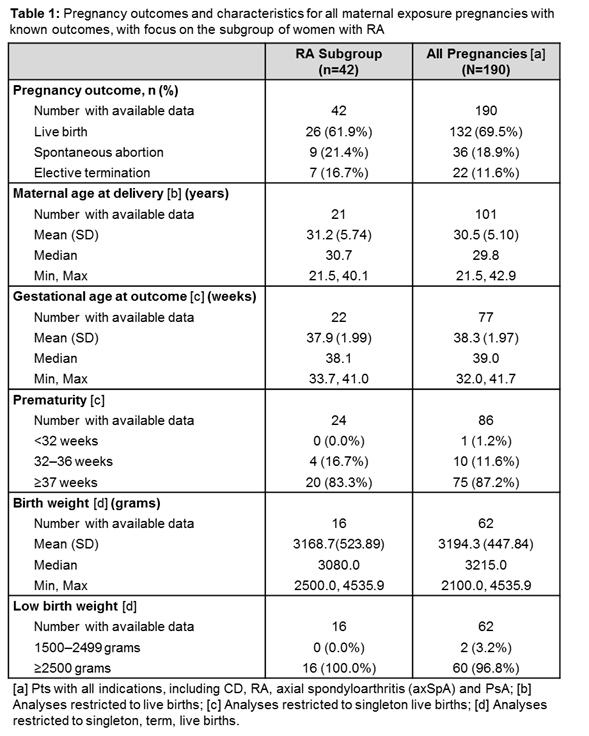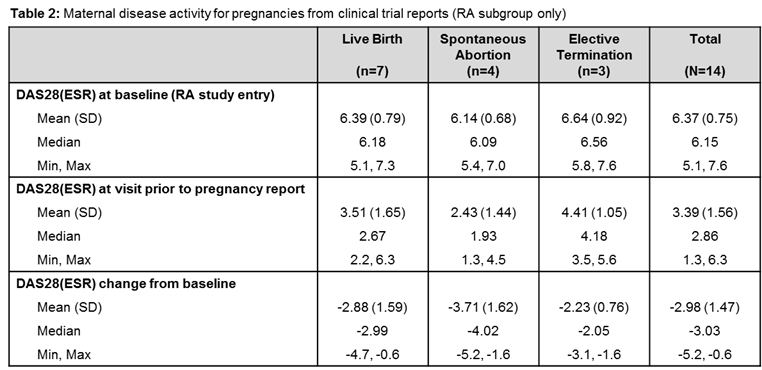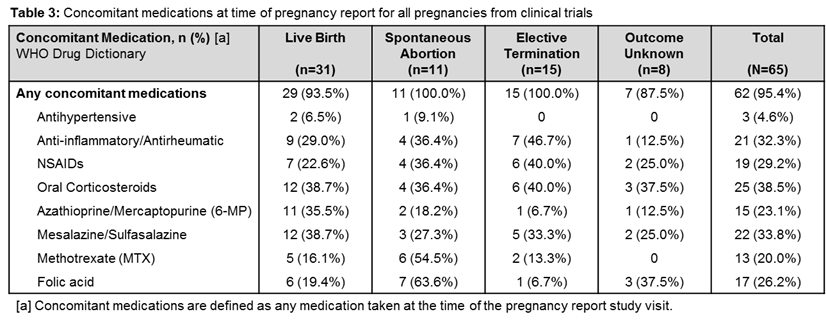Session Information
Title: Rheumatoid Arthritis - Clinical Aspects (ACR): Comorbidities, Treatment Outcomes and Mortality
Session Type: Abstract Submissions (ACR)
Background/Purpose
Certolizumab pegol (CZP) is a PEGylated Fc-free anti-TNF approved for the treatment of RA, CD, psoriatic arthritis (PsA) and ankylosing spondylitis (AS). The objective was to provide an updated analysis of pregnancy outcomes in rheumatic patients (pts) after CZP exposure, with a focus on RA pregnancies, from clinical trial and spontaneous post-marketing reports. Concomitant medications and disease activity are also reported from clinical trials.
Methods
The UCB Pharma global safety database was searched for all medically confirmed cases of pregnancy through 28 March 2013. The number of live births, spontaneous miscarriages and elective terminations for neonates exposed to CZP (maternal/paternal exposure) was examined. Congenital abnormalities, neonatal deaths, maternal demographics, disease activity and concomitant medications were also investigated.
Results
309 CZP-exposed pregnancies were reported: 285 maternal exposure, 24 paternal. For maternal exposure pregnancies, the most common underlying maternal conditions were CD (190/285) and RA (52/285), with the remaining 43/285 for other indications (including AS and PsA). Pregnancy outcomes were available for 190 of 285 pregnancies: 42 in women with RA, 124 in CD and 24 in other rheumatic indications. Pregnancy outcomes, where reported, are shown in Table 1. Maternal disease activity in women with RA are shown in Table 2. Common concomitant medications in all pregnancies are shown in Table 3. 5 congenital anomalies were reported, in 4 neonates, among all maternal exposure live births (n=132): vesicoureteric reflux; congenital morbus hirschsprung disease and club foot; right aortic arch with aberrant left subclavian artery; mild unilateral hydronephrosis on antenatal ultrasound (healthy at birth). None were considered related to CZP by the treating physicians. A single neonatal death was reported after maternal exposure in one of a set of twins with gestation <26 weeks.
Conclusion
Updated analysis of pregnancy outcomes after exposure to CZP supports previous reports1 suggesting no apparent impact of maternal CZP exposure on pregnancy outcomes. Additional prospective data are required to better evaluate the safety of CZP in pregnancy and the role of concomitant medications and disease activity.
1. Clowse M. Arthritis Rheum 2012;64(S10):702
Disclosure:
M. E. B. Clowse,
UCB Pharma,
5;
D. C. Wolf,
Abbott, Genetech, GIVEN Imaging, Janssen Biotech Inc., Millennium Research Group, Prometheus Laboratories, Salix Pharmaceuticals, UCB Pharma,
5,
Abbott, Bristol-Myers Squibb, Genentech, GIVEN Imaging, Janssen Biotech Inc., Millennium Research Group, Prometheus Laboratories, UCB Pharma,
2,
Abbott, Janssen Biotech Inc., Prometheus, Salix, UCB Pharma, Warner Chilcott,
8;
F. Förger,
UCB Pharma and Roche,
5,
UCB Pharma and Roche,
8;
J. J. Cush,
Pfizer, Celgene, CORRONA, Amgen, NIH, Novartis, UCB Pharma,
2;
A. Golembesky,
UCB Pharma,
3,
UCB Pharma,
1;
L. Shaughnessy,
UCB Pharma,
3;
D. De Cuyper,
UCB Pharma,
3;
K. Luijtens,
UCB Pharma,
3;
S. Abbas,
UCB Pharma,
3;
U. Mahadevan,
Abbott, Janssen, Elan, Genetech, Shire, UCB Pharma, and research grants from Prometheus, Millenium and GSK,
5.
« Back to 2014 ACR/ARHP Annual Meeting
ACR Meeting Abstracts - https://acrabstracts.org/abstract/pregnancy-outcomes-after-exposure-to-certolizumab-pegol-updated-results-from-safety-surveillance/



